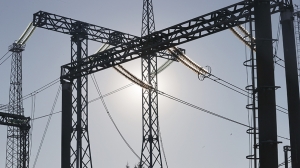Belarus third among European countries with cheapest electricity

MINSK, 24 October (BelTA) – Belarus ranks third among European countries with cheapest electricity, BelTA reports citing the press service of the Energy Ministry.
Speaking at the plenary session of the national committee of the Belenergotopgaz trade union, Energy Minister Viktor Karankevich emphasized the importance of the Belarusian nuclear power plant (BelNPP) as the country's biggest high-tech project that meets the most advanced safety requirements. He recalled that all participants of the Energy Expo forum, including foreign delegations, could study the advantages of the project and participate in a scientific and practical conference on nuclear energy prospects in Belarus. The agenda covered all aspects of the use of peaceful atom: the economic effect, the introduction of the latest technologies, and environmental benefits.
The BelNPP was designed primarily to meet the domestic electricity needs, the minister emphasized. At the same time, three most important tasks were solved. Firstly, Belarus managed to wean itself off the import of this source of energy. Secondly, the country reduced its reliance on imported natural gas. Thus, on 3 November 2020, when the first unit of the BelNPP was connected to the power grid, the plant generated a total of more than 20 billion kWh of electricity. In turn, this allowed replacing 5.3 billion cubic meters of natural gas. The foreign exchange burden on the economy decreased by more than $650 million. In addition, the environmental effect is obvious: greenhouse gas emissions shrank by more than 9 million tonnes.
The BelNPP helped meet the growing demand for electricity by the real sector of the economy and households (heating and hot water supply). “Reduced rates are in effect for energy-intensive industries and for households who use electricity for heating. This year, Belarus has ranked third among European countries with cheapest electricity,” the Energy Ministry emphasized. More than that, the nuclear power plant has become a driver of growth for related sectors of the economy. Currently, the introduction of a number of innovative solutions in industry, science, and medicine is underway. The city of nuclear energy specialists – Ostrovets - is growing vigorously, as well as Ostrovets District. And this was made possible in many ways due to the construction of the nuclear power plant.
Viktor Karankevich added that, on behalf of the head of state, the issue of building a second nuclear power plant in Belarus is being thoroughly studied. “The question is relevant. You see that more and more countries, including European ones, give preference to nuclear energy as a clean and reliable source of energy to address issues related to energy security and climate change. According to IAEA forecasts, by 2030 about 30 countries will commission nuclear energy reactors. Belarus also opted for nuclear energy and is enjoying its advantages. The construction of new units is seen as another important step to strengthen the energy independence of our state, as well as to further develop its economic and innovative potential,” he concluded.













